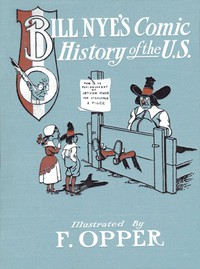Comic History of the United States by Bill Nye (book series for 10 year olds txt) 📗

- Author: Bill Nye
Book online «Comic History of the United States by Bill Nye (book series for 10 year olds txt) 📗». Author Bill Nye
The Americans now charged on the Indians, and Johnson, the commander of the Blue Grass Dragoons, fired a shot which took Tecumseh just west of the watch-pocket. He died, he said,[Pg 208] tickled to death to know that he had been shot by an American.
PROCTOR ON A TALL FOX-HUNTER WHICH RAN AWAY WITH HIM.
Captain Lawrence, of the Hornet, having taken the British brig Peacock, was given command of the Chesapeake, which he took to Boston to have repaired. While there, he got a challenge from the Shannon. He put to sea with half a crew, and a shot in his chest—that is, the arm-chest of the ship—burst the whole thing open and annoyed every one on board. The enemy boarded the Chesapeake and captured her, so Captain Lawrence, her brave commander, breathed his last, after begging his men not to give up the ship.
However, the victories on the Canadian border[Pg 209] settled the war once more for the time, and cheered the Americans very much.
The Indians in 1813 fell upon Fort Mimms and massacred the entire garrison, men, women, and children, not because they felt a personal antipathy towards them, but because they—the red brothers—had sold their lands too low and their hearts were sad in their bosoms. There is really no fun in trading with an Indian, for he is devoid of business instincts, and reciprocity with the red brother has never been a success.
General Jackson took some troops and attacked the red brother, killing six hundred of him and capturing the rest of the herd. Jackson did not want to hear the Indians speak pieces and see them smoke the pipe of peace, but buried the dead and went home. He had very little of the romantic complaint which now and then breaks out regarding the Indian, but knew full well that all the Indians ever born on the face of the earth could not compensate for the cruel and violent death of one good, gentle, patient American mother.
Admiral Cockburn now began to pillage the coast of the Southern States and borrow communion services from the churches of Virginia and the Carolinas. He also murdered the sick in their beds.
Perhaps a word of apology is due the Indians[Pg 210] after all. Possibly they got their ideas from Cockburn.
The battle of Lundy's Lane had been arranged for July 25, 1814, and so the Americans crossed Niagara under General Brown to invade Canada. General Winfield Scott led the advance, and gained a brilliant victory, July 5, at Chippewa. The second engagement was at Lundy's Lane, within the sound of the mighty cataract. Old man Lundy, whose lane was used for the purpose, said that it was one of the bloodiest fights, by a good many gallons, that he ever attended. The battle was, however, barren of results, the historian says, though really an American victory from the stand-point of the tactician and professional gore-spiller.
HIS RAINBOW SMILE.
In September, Sir George Prevost took twelve thousand veteran troops who had served under Wellington, and started for Plattsburg. The ships of the British at the same time opened fire on the nine-dollar American navy, and were almost annihilated. The troops under Prevost started in to fight, but, learning of the destruction of the British fleet on Lake Champlain, Prevost fled like a frightened fawn, leaving his sick and wounded and large stores of lime-juice, porridge, and plum-pudding. The Americans, who had been living on chopped horse-feed and ginseng-root, took a week off and gave themselves up to the false joys of lime-juice and general good feeling.[Pg 211]
Along the coast the British destroyed everything they could lay their hands on; but perhaps the rudest thing they did was to enter Washington and burn the Capitol, the Congressional library, and the smoke-house in which President Madison kept his hams. Even now, when the writer is a guest of some great English dignitary, and perhaps at table picking the "merry-thought" of a canvas-back duck, the memory of this thing comes over him, and, burying his face in the costly napery, he gives himself up to grief until kind words and a celery-glass-full of turpentine, or something, bring back his buoyancy and rainbow smile. The hospitality and generous treatment of our English brother to Americans now is something beautiful, unaffected, and well worth a voyage across the qualmy sea to see, but when Cockburn burned down the Capitol and took the President's sugar-cured hams he did a rude act.
[Pg 212]
CHAPTER XXI. THE ADVANCE OF THE REPUBLIC.The administration now began to suffer at the hands of the people, many of whom criticised the conduct of the war and that of the President also. People met at Hartford and spoke so harshly that the Hartford Federalist obtained a reputation which clung to him for many years.
There being no cable in those days, the peace by Treaty of Ghent was not heard of in time to prevent the battle of New Orleans, January 8, 1815, there having been two weeks of peace as a matter of fact when this hot and fatal battle was fought.
General Pakenham, with a force of twelve thousand men by sea and land, attacked the city. The land forces found General Jackson intrenched several miles below the city. He had used cotton for fortifications at first, but a hot shot had set a big bunch of it on fire and rolled it over towards the powder-supplies, so that he did not use cotton any more.
General Pakenham was met by the solid phalanx of Tennessee and Kentucky riflemen, who[Pg 213] reserved their fire, as usual, until the loud uniform of the English could be distinctly heard, when they poured into their ranks a galling fire, as it was so tersely designated at the time. General Pakenham fell mortally wounded, and his troops were repulsed, but again rallied, only to be again repulsed. This went on until night, when General Lambert, who succeeded General Pakenham, withdrew, hopelessly beaten, and with a loss of over two thousand men.
The United States now found that an honorable peace had been obtained, and with a debt of $127,000,000 started in to pay it up by instalments, which was done inside of twenty years from the ordinary revenue.
In the six years following, one State per year was added to the Union, and all kinds of manufactures were built up to supply the goods that had been cut off by the blockade during the war. Even the deluge of cheap goods from abroad after the war did not succeed in breaking these down.
James Monroe was almost unanimously elected. He was generally beloved, and his administration was, in fact, known as the original "era of good feeling," since so successfully reproduced especially by the Governors of North and South Carolina. (See Appendix.)
Through the efforts of Henry Clay, Missouri[Pg 214] was admitted as a slave State in 1821, under the compromise that slavery should not be admitted into any of the Territories west of the Mississippi and north of parallel 36° 30' N.
Clay was one of the greatest men of his time, and was especially eminent as an eloquent and magnetic speaker in the days when the record for eloquence was disputed by the giants of American oratory, and before the Senate of the United States had become a wealthy club of men whose speeches are rarely printed except at so much per column, paid in advance.
Clay was the original patentee of the slogan for campaign use.
Lafayette revisited this country in 1819, and was greeted with the greatest hospitality. He visited the grave of Washington, and tenderly spoke of the grandeur of character shown by his chief.
He was given the use of the Brandywine, a government ship, for his return. As he stood on the deck of the vessel at Pier 1, North River, his mind again recurred to Washington, and to those on shore he said that "to show Washington's love of truth, even as a child, he could tell an interesting incident of him relating to a little new hatchet given him at the time by his father." As he reached this point in his remarks, Lafayette noted with surprise that some one had slipped his cable[Pg 215] from shore and his ship was gently shoved off by people on the pier, while his voice was drowned in the notes of the New York Oompah Oompah Band as it struck up "Johnny, git yer Gun."
Florida was ceded to the United States in the same year by Spain, and was sprinkled over with a light coating of sand for the waves to monkey with. The Everglades of Florida are not yet under cultivation.
Mr. Monroe became the author of what is now called the "Monroe doctrine,"—viz., that the effort of any foreign country to obtain dominion in America would thereafter and forever afterwards be regarded as an unfriendly act. Rather than be regarded as unfriendly, foreign countries now refrain from doing their dominion or dynasty work here.
The Whigs now appeared, and the old Republican party became known as the Democratic party. John Quincy Adams and Henry Clay were Whigs, and John C. Calhoun and Andrew Jackson were Democrats. The Whigs favored a high protective tariff and internal improvement. The Democrats did not favor anything especially, but bitterly opposed the Whig measures, whatever they were.
BALD-HEADED MEN NOT APPRECIATED.
In 1825, John Quincy Adams, son of John Adams, was elected President, and served one term. He was a bald-headed man, and the coun[Pg 216]try was given four years of unexampled prosperity. Yet this experience has not been regarded by the people as it should have been. Other kinds of men have repeatedly been elected to that office, only to bring sorrow, war, debt, and bank-failures upon us. Sometimes it would seem to the thinking mind that, as a people, we need a few car-loads of sense in each school-district, where it can be used at a moment's notice.
Adams was not re-elected, on account of his tariff ideas, which were not popular at the South. He was called "The old man eloquent," and it is said that during his more impassioned passages his head, which was round and extremely smooth, became flushed, so that, from resembling the cue-ball on the start, as he rose to more lofty heights his dome of thought looked more like the spot ball on a billiard-table. No one else in Congress at that time had succeeded in doing this.[Pg 217]
John Quincy Adams was succeeded in 1829 by Andrew Jackson, the hero of New Orleans. Jackson was the first to introduce what he called "rotation in office." During the forty years previous there had been but seventy-four removals; Jackson made seven hundred. This custom has been pretty generally adopted since, giving immense satisfaction to those who thrive upon the excitement of offensive partisanship and their wives' relations, while those who have legitimate employment and pay taxes support and educate a new official kindergarten with every change of administration.
The prophet sees in the distance an eight-year term for the President, and employment thereafter as "charge-d'affaires" of the United States, with permission to go beyond the





Comments (0)